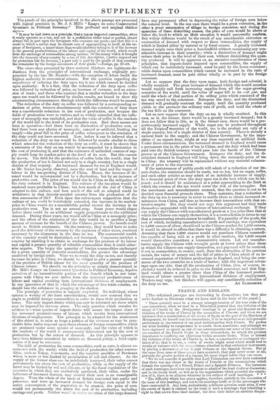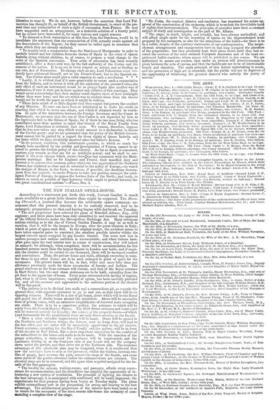FRANCE AND ENGLAND.
[The subjoined passages are interesting in themselves; but they also serve further to illustrate what we have said in the body of the paper.]
" There certainly must be a strange misapprehension of the true state of the case somewhere, when we read in a Ministenal journal that the violation of the treaty of Utrecht by the Montpensier marriage is as gross and flagrant as the violation of the treaty of Vienna by the annexation of Cracow; and when we are informed that a renunciation of the crown of Spain on the part of the Dntchess of Montpensier, for herself and her descendants, is to be regarded as an indispensable preliminary to the renewal of our good understanding with France. We profess our utter inability to comprehend or to credit these assertions; and although we have expressed as openly as any of our contemporaries our sense of the mischiev- ous conduct of the French Court in these transactions, we attach the greatest importance to confining our objections within accurate limits. What is termed the violation of the treaty of Utrecht is, in fact, a constructive or contingent vio- lation of it; that is to say, a series of events might occur which would lead to results at variance with the mnunciations attached to that celebrated instrument, by placing a descendant of the Regent Orleans on the Spanish throne. But at the same time, none of these events have occurred; they may never occur at all; probably the greater .portion of a human life must elapse before they can occur.
" We do not conceive it possible that Lord Palmerston can ever have contended that there was any clause in the treaty of Utrecht or the renunciations which forbade the marriage of a French Prince and a Spanish Princess. The instances of such marriages have been too frequent to admit of the least doubt or discussion; and in the treaty itself, as well as in the negotiations which preceded the conclu- sion of it, there is no allusion whatever to the subject of such marriages. * * '
"The difficulty which has arisen applies, therefore, entirely to the succession of the issue of this marriage, and not to the marriage itself, or to the personages who have contracted it. And here, undoubtedly, a delicate question must arise, if ever the crown of Spain is claimed by the issue of such a marriage; they inheriting a right to that crown from their mother, but from their father an absolute diaqua-
lineation to wear it. We do not, however, believe the assertion that Lord Pal- merston has thought fit, on behalf of the British Government, to exact at the pre- sent time any renunciation of such a right of succession from France. He may have suggested such an arrangement, as a desirable solution of a knotty paint; but he cannot have demanded it, for many various and cogent reasons. " To demand a fresh renunciation at this time from the Dutchess, would be to invalidate the argument that the renunciation of 1721 actually avails against all the descendants of the Regent; for they cannot be called upon to renounce that from which they are already excluded. " To require such a renunciation from the Dutchess of Montpensier in order to exclude herself and her children from the throne of Spain in the event of Queen Isabella dying without children, is, of course, to propose a total change in the order of the Spanish succession. That order of succession has been recently established, after a fierce civil war, by the full authority of the Cortes and the consent of the nation. It is an act in every respect as solemn and as binding as our own Act of Succession. To change such an act, Lord Palmerston must evi- dently have addressed himself, not to the French Court, but to the Spanish na- tion. The Cortes alone could give a valid sanction to such a revolution. * • • " Lastly, it is evident that if it were practicable to extort such a renunciation from the Infanta, and to invest it with all the authority of the present Cortes, the only effect of such an instrument would be to plunge Spain into another war of succession, if ever it were put in force against any children of this marriage. They would never acknowledge that their mother could deprive them of their birthright before they were born; and the act which was to exclude them from the throne would not be worth the paper on which it might be written.
"These facts admit of so little dispute that they cannot but govern the conduct of any Minister. No man can have been so infatuated as to stake his credit on exacting that which he never can obtain, and which if obtained would be worth- less. In spite of the interviews between the Foreign Secretary and the Count de Montemolin, we presume that the son of Don Carlos is not regarded by him as the l itimate heir to the throne of Spain; for if there be one man living who has contributed more than another to expel that branch of the Royal Family from Spain, Lord Palmerston is certainly that man. We cannot,- therefore, suppose that he has now taken any step which would amount to a declaration in favour of the Carlist party; and we are persuaded that the policy of the British Govern- ment cannot but be guided by a regard for those rights of Queen Isabella and
her heirs which we have invariably asserted since her father's decease. • •
"In its present condition, this unfortunate question, to which so much has already been sacrificed by the avidity and Iprecipitation of France, cannot be al- lowed to govern the foreign policy, of the country. As far as Spain is concerned, matters may remain as they are for an indefinite period; and we shall be sur- prised if the next change which occurs there as any connexion with the Mont- pensier marriage. But as for England and France, their manifest duty and interest is to pursue that common policy which the late aggression of the Northern Powers has rendered so clear and so essential to the safety of Europe,—to watch the designs of Russia in the East; to rescue, if possible, the Austrian Govern- ment from her control ; to excite Prussia to take her position amongst the intel- ligent Powers of Europe, to oppose the lawless force of the North; and lastly, to restore as much as possible of that harmony which ought to prevail between the two great constitutional nations."—Times, Dec. 2.



































 Previous page
Previous page